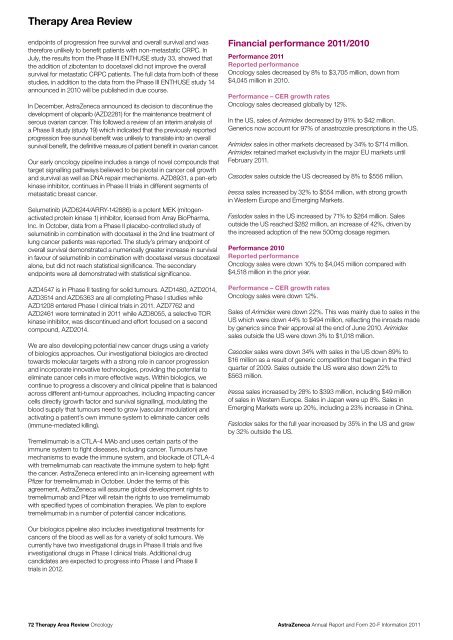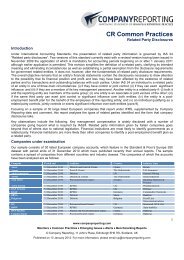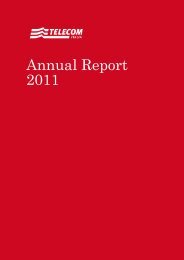AstraZeneca Annual Report and Form 20-F Information 2011
AstraZeneca Annual Report and Form 20-F Information 2011
AstraZeneca Annual Report and Form 20-F Information 2011
- No tags were found...
You also want an ePaper? Increase the reach of your titles
YUMPU automatically turns print PDFs into web optimized ePapers that Google loves.
Therapy Area Reviewendpoints of progression free survival <strong>and</strong> overall survival <strong>and</strong> wastherefore unlikely to benefit patients with non-metastatic CRPC. InJuly, the results from the Phase III ENTHUSE study 33, showed thatthe addition of zibotentan to docetaxel did not improve the overallsurvival for metastatic CRPC patients. The full data from both of thesestudies, in addition to the data from the Phase III ENTHUSE study 14announced in <strong>20</strong>10 will be published in due course.In December, <strong>AstraZeneca</strong> announced its decision to discontinue thedevelopment of olaparib (AZD2281) for the maintenance treatment ofserous ovarian cancer. This followed a review of an interim analysis ofa Phase II study (study 19) which indicated that the previously reportedprogression free survival benefit was unlikely to translate into an overallsurvival benefit, the definitive measure of patient benefit in ovarian cancer.Our early oncology pipeline includes a range of novel compounds thattarget signalling pathways believed to be pivotal in cancer cell growth<strong>and</strong> survival as well as DNA repair mechanisms. AZD8931, a pan-erbkinase inhibitor, continues in Phase II trials in different segments ofmetastatic breast cancer.Selumetinib (AZD6244/ARRY-142886) is a potent MEK (mitogenactivatedprotein kinase 1) inhibitor, licensed from Array BioPharma,Inc. In October, data from a Phase II placebo-controlled study ofselumetinib in combination with docetaxel in the 2nd line treatment oflung cancer patients was reported. The study’s primary endpoint ofoverall survival demonstrated a numerically greater increase in survivalin favour of selumetinib in combination with docetaxel versus docetaxelalone, but did not reach statistical significance. The secondaryendpoints were all demonstrated with statistical significance.AZD4547 is in Phase II testing for solid tumours. AZD1480, AZD<strong>20</strong>14,AZD3514 <strong>and</strong> AZD5363 are all completing Phase I studies whileAZD1<strong>20</strong>8 entered Phase I clinical trials in <strong>20</strong>11. AZD7762 <strong>and</strong>AZD2461 were terminated in <strong>20</strong>11 while AZD8055, a selective TORkinase inhibitor, was discontinued <strong>and</strong> effort focused on a secondcompound, AZD<strong>20</strong>14.We are also developing potential new cancer drugs using a varietyof biologics approaches. Our investigational biologics are directedtowards molecular targets with a strong role in cancer progression<strong>and</strong> incorporate innovative technologies, providing the potential toeliminate cancer cells in more effective ways. Within biologics, wecontinue to progress a discovery <strong>and</strong> clinical pipeline that is balancedacross different anti-tumour approaches, including impacting cancercells directly (growth factor <strong>and</strong> survival signalling), modulating theblood supply that tumours need to grow (vascular modulation) <strong>and</strong>activating a patient’s own immune system to eliminate cancer cells(immune-mediated killing).Tremelimumab is a CTLA-4 MAb <strong>and</strong> uses certain parts of theimmune system to fight diseases, including cancer. Tumours havemechanisms to evade the immune system, <strong>and</strong> blockade of CTLA-4with tremelimumab can reactivate the immune system to help fightthe cancer. <strong>AstraZeneca</strong> entered into an in-licensing agreement withPfizer for tremelimumab in October. Under the terms of thisagreement, <strong>AstraZeneca</strong> will assume global development rights totremelimumab <strong>and</strong> Pfizer will retain the rights to use tremelimumabwith specified types of combination therapies. We plan to exploretremelimumab in a number of potential cancer indications.Financial performance <strong>20</strong>11/<strong>20</strong>10Performance <strong>20</strong>11<strong>Report</strong>ed performanceOncology sales decreased by 8% to $3,705 million, down from$4,045 million in <strong>20</strong>10.Performance – CER growth ratesOncology sales decreased globally by 12%.In the US, sales of Arimidex decreased by 91% to $42 million.Generics now account for 97% of anastrozole prescriptions in the US.Arimidex sales in other markets decreased by 34% to $714 million.Arimidex retained market exclusivity in the major EU markets untilFebruary <strong>20</strong>11.Casodex sales outside the US decreased by 8% to $556 million.Iressa sales increased by 32% to $554 million, with strong growthin Western Europe <strong>and</strong> Emerging Markets.Faslodex sales in the US increased by 71% to $264 million. Salesoutside the US reached $282 million, an increase of 42%, driven bythe increased adoption of the new 500mg dosage regimen.Performance <strong>20</strong>10<strong>Report</strong>ed performanceOncology sales were down 10% to $4,045 million compared with$4,518 million in the prior year.Performance – CER growth ratesOncology sales were down 12%.Sales of Arimidex were down 22%. This was mainly due to sales in theUS which were down 44% to $494 million, reflecting the inroads madeby generics since their approval at the end of June <strong>20</strong>10. Arimidexsales outside the US were down 3% to $1,018 million.Casodex sales were down 34% with sales in the US down 89% to$16 million as a result of generic competition that began in the thirdquarter of <strong>20</strong>09. Sales outside the US were also down 22% to$563 million.Iressa sales increased by 28% to $393 million, including $49 millionof sales in Western Europe. Sales in Japan were up 8%. Sales inEmerging Markets were up <strong>20</strong>%, including a 23% increase in China.Faslodex sales for the full year increased by 35% in the US <strong>and</strong> grewby 32% outside the US.Our biologics pipeline also includes investigational treatments forcancers of the blood as well as for a variety of solid tumours. Wecurrently have two investigational drugs in Phase II trials <strong>and</strong> fiveinvestigational drugs in Phase I clinical trials. Additional drugc<strong>and</strong>idates are expected to progress into Phase I <strong>and</strong> Phase IItrials in <strong>20</strong>12.72 Therapy Area Review Oncology<strong>AstraZeneca</strong> <strong>Annual</strong> <strong>Report</strong> <strong>and</strong> <strong>Form</strong> <strong>20</strong>-F <strong>Information</strong> <strong>20</strong>11










